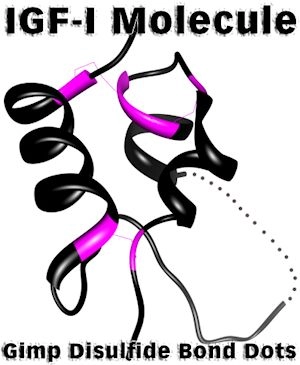Video Link: https://vimeo.com/563072825
Video Download: Comprehensive Blood Panel For Women Interested In Hormone Replacement Therapy
Video Stream: Comprehensive Blood Panel For Women Interested In Hormone Replacement Therapy
Providing our patients the best possible care is of the utmost importance to the HRT Specialists at our Hormone Therapy Clinic. Hormone Therapy is low-risk and highly effective when prescribed and administered correctly.
 Before we offer Hormone Treatments to our patients, we conduct a thorough investigation of the patient's health with the help of a Comprehensive Blood Panel.
Before we offer Hormone Treatments to our patients, we conduct a thorough investigation of the patient's health with the help of a Comprehensive Blood Panel.
We work with industry leaders LabCorp and Quest Diagnostics to fulfill the preliminary requirements for diagnosis and treatment. The following is a list of blood tests we conduct for women interested in Hormone Replacement Therapy.
Estradiol Test
Estrogen is one of the most essential hormones associated with women's health. Around the time of Menopause, Estrogen Levels enter a state of erratic fluctuation before dropping precipitously.
Estrogen therapy can help women overcome the health issues that can crop up during this challenging time in a woman's life. Estradiol Testing allows doctors to design a Hormone Therapy Protocol built to fit your age and your current needs.
Pregnenolone Test
Pregnenolone is a base hormone that the body uses to construct more complex steroid hormones. Pregnenolone is the base of both Testosterone and Estrogen. It's also vital to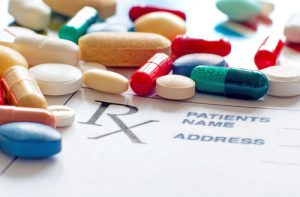 neurological health. Like HGH and many other hormones, Pregnenolone Levels tend to fall into decline with age.
neurological health. Like HGH and many other hormones, Pregnenolone Levels tend to fall into decline with age.
As Pregnenolone Levels fall, Cortisol Levels tend to increase, both of which have a negative impact on wellness and Hormone Balance.
Pregnenolone Hormone Therapy is a useful tool that can benefit women struggling with Menopause, and it's also used to treat PMS, Endometriosis, and Fibrocystic Breast Disease.
Progesterone Test
Progesterone and Estrogen are the two central hormones associated with feminine reproduction. High Levels of Progesterone can cause symptoms related to PMS. Progesterone/Estrogen Balance is vital for women's health.
Progesterone Deficiency can lead to issues such as anxiety, depression, low sex drive, and hot flashes. Progesterone Therapy can help women overcome many frustrating symptoms of Menopause and Perimenopause.
Insulin-like Growth Factor-1 Test
IGF-1 Testing is the most direct means to diagnose Human Growth Hormone Deficiency. 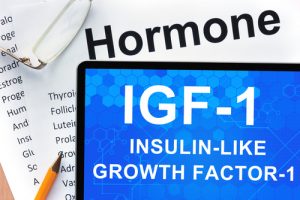 HGH Levels are hard to track because Human Growth Hormone is produced sporadically and metabolized quickly.
HGH Levels are hard to track because Human Growth Hormone is produced sporadically and metabolized quickly.
IGF-1 is a direct byproduct of HGH metabolism and remains present in the bloodstream at steady levels. By testing IGF-1 levels in the bloodstream, we can easily infer Growth Hormone Production and identify Human Growth Hormone Deficiency.
A1C Evaluation
Before starting any Hormone Therapy Regimen (but especially HGH Injection Therapy), it's necessary to be tested for Insulin Resistance. The AIC Glucose Test approximates your median glucose levels for the past three months, which is critical for diagnosing Pre-Diabetic Insulin Resistance and Diabetes.
Fasting Insulin Test
This test measures your baseline Insulin Levels on an empty stomach. It measures the amount of Insulin in your bloodstream when your digestive system is at rest and should be drawing energy from body fat.
Along with the A1C Hemoglobin Test, this test looks for signs of Insulin Resistance, Diabetes, or Hypoglycemia.
SHBG Test
The Sex hormone-binding Globulin Test measures the volume of SHBG in your bloodstream, which impacts the expression of Estrogen and Testosterone. SHBG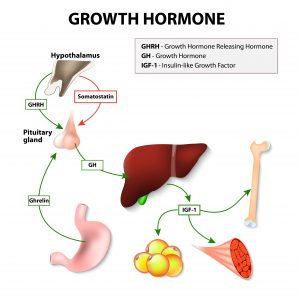 transports and stores Sex Hormones.
transports and stores Sex Hormones.
If SHBG levels are high, it can lead to symptoms of Sex Hormone Deficiency even if your body is producing plenty of the hormones.
FSH/LH Tests
Follicle Stimulating Hormone and Luteinizing Hormone are two crucial sex hormones critical for normal sexual function. FSH triggers the production of Estrogen and Progesterone and stimulates the production of eggs.
Luteinizing Hormone activates ovulation. Healthy LH/FSH Levels are vital for the normal function of the menstrual cycle and normal cyclical production of Progesterone and Estrogen.
Free/Total Testosterone Tests
While women don't produce nearly as much Testosterone as men, Testosterone still plays a significant role in women's health. Low Testosterone in Women is associated with diminished sex drive, depression, fatigue, and loss of muscle mass.
Because women produce so little Testosterone, symptoms of Low-T can manifest quite easily with small changes in Hormone Balance.
Thyroid Function Tests
The Thyroid is the command center for metabolism and sends signals to the various organs and systems of the body to control the rate of activity. It's central to basal metabolic rate and temperature regulation.
Both Hypothyroidism and Hyperthyroidism have significant consequences on baseline metabolic activity. The following tests are conducted to assess Thyroid Function:
- Free/Total Triiodothyronine (T3) – T3 is the strongest tool the Thyroid uses to modulate metabolism throughout the body.
- Free/Total Thyroxine (T4) – T4 acts on target cells to control metabolism and also encourages the production of more potent T3.
- Thyroid Stimulating Hormone (TSH) – TSH is released by the Pituitary Gland to induce the release of T3/T4 by the Thyroid.
Cortisol Test
Cortisol is a key hormone intimately involved in stress response. Cortisol is responsible for activating fight-or-flight. While Cortisol has a valuable and necessary function, it is quite 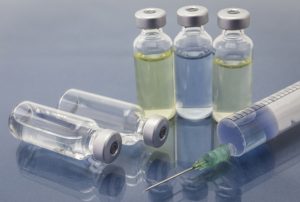 prone to over-expression.
prone to over-expression.
Elevated Cortisol levels are associated with anxiety, chronic fatigue, and increased risk of cardiovascular problems and Hormone Imbalance. Correcting chronically high Cortisol Levels can help restore balance.
DHEA Sulfate Test
DHEA is a sexual precursor hormone. It helps produce both Estrogen and Testosterone. Elevated Levels of DHEA are associated with symptoms of masculinization in women. DHEA Deficiency leads to low libido and sexual dysfunction. High Levels of DHEA contribute to an Overactive Immune System.
Serum Ferritin Test
This test measures your body's ability to store iron for future utilization. If Serum Ferritin Levels are low, this is a strong indicator of Anemia and can also lead to Restless Leg Syndrome. Levels of Ferritin often increase as a response to infection and illness.
Complete Blood Count
These tests provide information regarding various cells/organelles in the bloodstream.
- White Blood Cells – These cells are your primary line of defense against illness and infection. A healthy white blood cell count is a sign of a healthy immune system.
- Red Blood Cells – These cells are responsible for supplying oxygen and extracting carbon dioxide from the circulatory system. Some Hormone Treatments can increase RBC count, which can lead to cardiovascular risks in some patients.
- Hemoglobin – Hemoglobin is the iron-based organelle which facilitates the transport of Oxygen/Carbon Dioxide by the Red Blood Cells. Low levels of Hemoglobin are associated with Anemia.
- Hematocrit – This test reveals the approximate volume of Red Blood Cells in the bloodstream. Some medications/treatments can slightly increase this volume, and certain health issues, such as Leukemia and Anemia, can suppress the volume.
- Platelets – These cells are the tools that your body uses to cause clotting. While clotting is a necessary function, high platelet levels can be dangerous and lead to heart attack/stroke. Low Platelet Levels contribute to increased bleeding and bruising.
Comprehensive Metabolic Panel
This collection of tests is designed to provide information regarding levels of 14 organic compounds and minerals that are critical to normal and healthy function. These tests 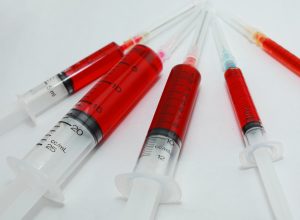 evaluate the following aspects of your health:
evaluate the following aspects of your health:
- Kidney Function
- Fluid/Electrolyte Balance
- Liver Function
- Glucose Balance
Lipid Panel
These tests assess levels of Cholesterol and other lipid compounds found in the bloodstream and their relative concentrations. The following factors are evaluated:
- Triglycerides – The body converts unused energy taken from calories and converts them into triglycerides for storage. Elevated Triglycerides can be dangerous and increase the risk of heart disease, atherosclerosis, and stroke.
- LDL Cholesterol - “Bad” Cholesterol Levels that must be kept in check to preserve cardiovascular health.
- HDL Cholesterol - “Good” Cholesterol that is negatively impacted by poor diet and lifestyle. Higher HDL Cholesterol Levels are a sign of good health.
- Total Cholesterol – The undifferentiated amount of HDL/LDL Cholesterol and Triglycerides in the blood.
These tests are also used to determine the individual ratios of HDL/LDL Cholesterol in comparison to total Cholesterol.
Contact Us For A Fast And Professional Response

- Cheyenne Sermorelin for HGH Deficiency [Last Updated On: April 6th, 2023] [Originally Added On: November 3rd, 2018]
- Milwaukee Sermorelin for HGH Deficiency [Last Updated On: April 19th, 2023] [Originally Added On: November 3rd, 2018]
- Madison Sermorelin for HGH Deficiency [Last Updated On: February 14th, 2023] [Originally Added On: November 3rd, 2018]
- Green Bay Sermorelin for HGH Deficiency [Last Updated On: May 10th, 2023] [Originally Added On: November 3rd, 2018]
- Charleston Sermorelin for HGH Deficiency [Last Updated On: February 26th, 2023] [Originally Added On: November 3rd, 2018]
- Vancouver Sermorelin for HGH Deficiency [Last Updated On: October 2nd, 2023] [Originally Added On: November 3rd, 2018]
- Tacoma Sermorelin for HGH Deficiency [Last Updated On: May 28th, 2023] [Originally Added On: November 3rd, 2018]
- Spokane Sermorelin for HGH Deficiency [Last Updated On: March 23rd, 2023] [Originally Added On: November 3rd, 2018]
- Seattle Sermorelin for HGH Deficiency [Last Updated On: May 16th, 2023] [Originally Added On: November 3rd, 2018]
- Bellevue Sermorelin for HGH Deficiency [Last Updated On: March 6th, 2023] [Originally Added On: November 3rd, 2018]
- Virginia Beach Sermorelin for HGH Deficiency [Last Updated On: March 23rd, 2023] [Originally Added On: November 3rd, 2018]
- Richmond Sermorelin for HGH Deficiency [Last Updated On: April 23rd, 2023] [Originally Added On: November 3rd, 2018]
- Portsmouth Sermorelin for HGH Deficiency [Last Updated On: February 18th, 2023] [Originally Added On: November 3rd, 2018]
- Norfolk Sermorelin for HGH Deficiency [Last Updated On: October 12th, 2023] [Originally Added On: November 3rd, 2018]
- Newport News Sermorelin for HGH Deficiency [Last Updated On: January 7th, 2023] [Originally Added On: November 3rd, 2018]
- Hampton Sermorelin for HGH Deficiency [Last Updated On: April 17th, 2023] [Originally Added On: November 3rd, 2018]
- Chesapeake Sermorelin for HGH Deficiency [Last Updated On: March 27th, 2023] [Originally Added On: November 3rd, 2018]
- Arlington, Virginia Sermorelin for HGH Deficiency [Last Updated On: July 24th, 2023] [Originally Added On: November 3rd, 2018]
- Alexandria Sermorelin for HGH Deficiency [Last Updated On: May 27th, 2023] [Originally Added On: November 3rd, 2018]
- Montpelier Sermorelin for HGH Deficiency [Last Updated On: May 2nd, 2023] [Originally Added On: November 3rd, 2018]
- West Valley City Sermorelin for HGH Deficiency [Last Updated On: December 27th, 2023] [Originally Added On: November 3rd, 2018]
- West Jordan Sermorelin for HGH Deficiency [Last Updated On: April 27th, 2023] [Originally Added On: November 3rd, 2018]
- Salt Lake City Sermorelin for HGH Deficiency [Last Updated On: July 11th, 2023] [Originally Added On: November 3rd, 2018]
- Provo Sermorelin for HGH Deficiency [Last Updated On: March 11th, 2023] [Originally Added On: November 4th, 2018]
- Wichita Falls Sermorelin for HGH Deficiency [Last Updated On: May 26th, 2023] [Originally Added On: November 4th, 2018]
- Waco Sermorelin for HGH Deficiency [Last Updated On: February 19th, 2023] [Originally Added On: November 4th, 2018]
- San Antonio Sermorelin for HGH Deficiency [Last Updated On: November 5th, 2023] [Originally Added On: November 4th, 2018]
- Round Rock Sermorelin for HGH Deficiency [Last Updated On: November 11th, 2023] [Originally Added On: November 4th, 2018]
- Richardson Sermorelin for HGH Deficiency [Last Updated On: February 7th, 2023] [Originally Added On: November 4th, 2018]
- Plano Sermorelin for HGH Deficiency [Last Updated On: July 18th, 2023] [Originally Added On: November 4th, 2018]
- Pasadena Sermorelin for HGH Deficiency [Last Updated On: September 7th, 2023] [Originally Added On: November 4th, 2018]
- Midland Sermorelin for HGH Deficiency [Last Updated On: November 22nd, 2023] [Originally Added On: November 4th, 2018]
- Mesquite Sermorelin for HGH Deficiency [Last Updated On: October 22nd, 2023] [Originally Added On: November 4th, 2018]
- McKinney Sermorelin for HGH Deficiency [Last Updated On: December 21st, 2023] [Originally Added On: November 4th, 2018]
- McAllen Sermorelin for HGH Deficiency [Last Updated On: February 17th, 2023] [Originally Added On: November 4th, 2018]
- Lubbock Sermorelin for HGH Deficiency [Last Updated On: September 10th, 2023] [Originally Added On: November 4th, 2018]
- Lewisville Sermorelin for HGH Deficiency [Last Updated On: September 7th, 2023] [Originally Added On: November 4th, 2018]
- Laredo Sermorelin for HGH Deficiency [Last Updated On: August 10th, 2023] [Originally Added On: November 4th, 2018]
- Killeen Sermorelin for HGH Deficiency [Last Updated On: February 23rd, 2023] [Originally Added On: November 4th, 2018]
- Irving Sermorelin for HGH Deficiency [Last Updated On: April 29th, 2023] [Originally Added On: November 4th, 2018]
- Houston Sermorelin for HGH Deficiency [Last Updated On: October 2nd, 2023] [Originally Added On: November 4th, 2018]
- Grand Prairie Sermorelin for HGH Deficiency [Last Updated On: May 18th, 2023] [Originally Added On: November 4th, 2018]
- Garland Sermorelin for HGH Deficiency [Last Updated On: March 7th, 2023] [Originally Added On: November 4th, 2018]
- Fort Worth Sermorelin for HGH Deficiency [Last Updated On: October 28th, 2023] [Originally Added On: November 4th, 2018]
- El Paso Sermorelin for HGH Deficiency [Last Updated On: January 8th, 2023] [Originally Added On: November 4th, 2018]
- Denton Sermorelin for HGH Deficiency [Last Updated On: February 21st, 2023] [Originally Added On: November 4th, 2018]
- Dallas Sermorelin for HGH Deficiency [Last Updated On: April 30th, 2023] [Originally Added On: November 4th, 2018]
- Corpus Christi Sermorelin for HGH Deficiency [Last Updated On: July 30th, 2023] [Originally Added On: November 4th, 2018]
- Carrollton Sermorelin for HGH Deficiency [Last Updated On: February 4th, 2023] [Originally Added On: November 4th, 2018]
- Brownsville Sermorelin for HGH Deficiency [Last Updated On: April 10th, 2023] [Originally Added On: November 4th, 2018]
- Beaumont Sermorelin for HGH Deficiency [Last Updated On: November 27th, 2023] [Originally Added On: November 4th, 2018]
- Austin Sermorelin for HGH Deficiency [Last Updated On: May 13th, 2023] [Originally Added On: November 4th, 2018]
- Arlington Sermorelin for HGH Deficiency [Last Updated On: April 16th, 2023] [Originally Added On: November 4th, 2018]
- Amarillo Sermorelin for HGH Deficiency [Last Updated On: May 14th, 2023] [Originally Added On: November 4th, 2018]
- Abilene Sermorelin for HGH Deficiency [Last Updated On: December 26th, 2023] [Originally Added On: November 4th, 2018]
- Nashville Sermorelin for HGH Deficiency [Last Updated On: March 16th, 2023] [Originally Added On: November 4th, 2018]
- Murfreesboro Sermorelin for HGH Deficiency [Last Updated On: May 18th, 2023] [Originally Added On: November 4th, 2018]
- Memphis Sermorelin for HGH Deficiency [Last Updated On: November 24th, 2023] [Originally Added On: November 4th, 2018]
- Knoxville Sermorelin for HGH Deficiency [Last Updated On: July 16th, 2023] [Originally Added On: November 4th, 2018]
- Clarksville Sermorelin for HGH Deficiency [Last Updated On: July 14th, 2023] [Originally Added On: November 4th, 2018]
- Chattanooga Sermorelin for HGH Deficiency [Last Updated On: May 15th, 2023] [Originally Added On: November 4th, 2018]
- Sioux Falls Sermorelin for HGH Deficiency [Last Updated On: March 5th, 2023] [Originally Added On: November 4th, 2018]
- Columbia Sermorelin for HGH Deficiency [Last Updated On: April 25th, 2023] [Originally Added On: November 4th, 2018]
- Charleston, South Carolina Sermorelin for HGH Deficiency [Last Updated On: October 13th, 2023] [Originally Added On: November 4th, 2018]
- Providence Sermorelin for HGH Deficiency [Last Updated On: April 23rd, 2023] [Originally Added On: November 4th, 2018]
- Pittsburgh Sermorelin for HGH Deficiency [Last Updated On: November 10th, 2023] [Originally Added On: November 4th, 2018]
- Philadelphia Sermorelin for HGH Deficiency [Last Updated On: May 5th, 2023] [Originally Added On: November 4th, 2018]
- Erie Sermorelin for HGH Deficiency [Last Updated On: August 21st, 2023] [Originally Added On: November 4th, 2018]
- Allentown Sermorelin for HGH Deficiency [Last Updated On: February 2nd, 2023] [Originally Added On: November 4th, 2018]
- Salem Sermorelin for HGH Deficiency [Last Updated On: September 25th, 2023] [Originally Added On: November 4th, 2018]
- Portland Sermorelin for HGH Deficiency [Last Updated On: June 29th, 2023] [Originally Added On: November 4th, 2018]
- Gresham Sermorelin for HGH Deficiency [Last Updated On: March 22nd, 2023] [Originally Added On: November 4th, 2018]
- Eugene Sermorelin for HGH Deficiency [Last Updated On: April 30th, 2023] [Originally Added On: November 4th, 2018]
- Tulsa Sermorelin for HGH Deficiency [Last Updated On: September 18th, 2023] [Originally Added On: November 4th, 2018]
- Oklahoma City Sermorelin for HGH Deficiency [Last Updated On: August 22nd, 2023] [Originally Added On: November 4th, 2018]
- Norman Sermorelin for HGH Deficiency [Last Updated On: March 23rd, 2023] [Originally Added On: November 4th, 2018]
- Toledo Sermorelin for HGH Deficiency [Last Updated On: January 29th, 2023] [Originally Added On: November 4th, 2018]
- Dayton Sermorelin for HGH Deficiency [Last Updated On: July 2nd, 2023] [Originally Added On: November 4th, 2018]
- Columbus, Ohio Sermorelin for HGH Deficiency [Last Updated On: July 25th, 2023] [Originally Added On: November 4th, 2018]
- Cleveland Sermorelin for HGH Deficiency [Last Updated On: April 29th, 2023] [Originally Added On: November 4th, 2018]












